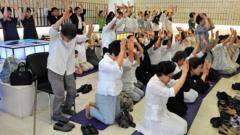The church, which has been established in Japan since the 1960s, faced severe backlash following allegations that the alleged assassin acted out of grief over his family's financial ruin attributed to the church’s practices. The Japanese government, represented by the education and culture ministry, has condemned these activities, asserting they exploit vulnerable individuals.
Further investigations uncovered that the church coerced members into purchasing high-priced goods by exploiting fears related to spiritual well-being. Reports indicate around 200 individuals have sought compensation for financial losses totaling approximately 5.7 billion yen ($38.5 million).
In the wake of Abe's assassination, the Unification Church's affiliations with lawmakers within the ruling Liberal Democratic Party (LDP) emerged, leading to public outrage. Investigations revealed that nearly half of LDP lawmakers had interactions with the church, ranging from attending events to receiving donations. The exposure of these deep-rooted connections has prompted a crisis of trust in the political landscape, culminating in the resignation of four government ministers.
This ruling symbolizes a significant shift in Japan's approach to controversial religious organizations, setting a precedent for potential reforms and increased regulation in the religious sector.
The unification Church was founded in South Korea by Sun Myung Moon and has a complex legacy intertwined with legal, cultural, and now, political repercussions in Japan. As the situation develops, the implications of this ruling will likely resonate within the country's socio-political discourse.
Further investigations uncovered that the church coerced members into purchasing high-priced goods by exploiting fears related to spiritual well-being. Reports indicate around 200 individuals have sought compensation for financial losses totaling approximately 5.7 billion yen ($38.5 million).
In the wake of Abe's assassination, the Unification Church's affiliations with lawmakers within the ruling Liberal Democratic Party (LDP) emerged, leading to public outrage. Investigations revealed that nearly half of LDP lawmakers had interactions with the church, ranging from attending events to receiving donations. The exposure of these deep-rooted connections has prompted a crisis of trust in the political landscape, culminating in the resignation of four government ministers.
This ruling symbolizes a significant shift in Japan's approach to controversial religious organizations, setting a precedent for potential reforms and increased regulation in the religious sector.
The unification Church was founded in South Korea by Sun Myung Moon and has a complex legacy intertwined with legal, cultural, and now, political repercussions in Japan. As the situation develops, the implications of this ruling will likely resonate within the country's socio-political discourse.


















